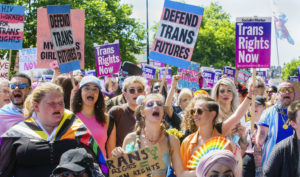The battle to set up domestic violence refuges for vulnerable women was long and hard. After years of campaigning, feminists finally won it in the early Seventies. A few years later, rape crisis centres followed. Now, more than four decades later, rape conviction rates are at an all-time low and reports of domestic violence are increasing. The need for female-only spaces is greater than ever. And yet, feminists are having to do battle all over again.
“Many women only feel comfortable talking about the intimate and devastating details of male violence in a safe environment. And a safe environment means a women-only one,” writes Karen Ingala Smith in a new book, Defending Women’s Spaces. This is her debut, but she is already hard at work on her second, about femicide. Ingala Smith has spent a total of 32 years working in women’s organisations that tackle men’s violence. As the CEO of the nia project, a service for women and girls who have been subjected to sexual and domestic abuse, and the founder of both Counting Dead Women and the UK Femicide Census (analysing cases of women and girls killed by men), no one is better-placed to comment on what female victims of male violence need.
However, the existence of Defending Women’s Spaces is deemed so dangerous that the ticketing giant Eventbrite deleted the link to the online launch a few weeks ago, and began issuing refunds. According to Eventbrite’s Trust and Safety team, the event was in danger of violating its policy on “hateful, dangerous or violent content”. Keeping women and girls safe from male violence, and enabling them to recover from it — the main topics of the book — are now seen as hateful activities, according to those that believe excluding trans-identified men is bigotry.
Feminists fought for the introduction of the 2010 Equality Act, which allows for the provision of separate or single-sex services in certain circumstances — for example, in toilets, changing rooms, refuges and hospital wards. So why do our hard-won rights still need defending?
In recent years, trans rights organisations such as Stonewall have been campaigning to end female-only provision. For example, in 2015, Stonewall’s submission to the Women and Equalities Select Committee Inquiry on Transgender Equality included demands for a review of the Equality Act to include “gender identity” rather than “gender reassignment” as a protected characteristic. They also argued for removing any circumstances in which single-sex spaces were allowed.
The charity Gendered Intelligence have also made it clear they would do away with our right to single-sex provision by calling for “a comprehensive review of the legislation affecting trans people (and intersex people) with the aim of deleting the exceptions laid out [in the Equality Act]”. Both groups, along with political parties such as the Greens, Women’s Equality Party and some sections of Labour, are also in favour of self-ID, which would allow men to identify as women without the requirement of any medical intervention. Doing so would legally permit them to access women’s single-sex services.
Ingala Smith is fighting back. “This is not about trans people in women’s spaces,” she says. “It is about men in women’s spaces. Declaring yourself to be a woman does not alter that you are male.” She is in step with the UN special rapporteur on violence against women and girls, who last week wrote to Nicola Sturgeon to warn her that self-ID would be open to abuse by male sex offenders, and thereby put women and girls in danger. The Equality and Human Rights Commission has also raised a number of concerns about such a policy.
Nevertheless, the Women’s Equality Party last week became the latest political entity to jump on the bandwagon, passing a motion that supports self-ID. (That motion was proposed by its leader, Mandu Reid.) What does Ingala Smith think of a political party supposedly set up to defend the rights of women taking this line? “Reid has just signed the party death warrant.”
For those who want to understand why feminists campaign against trans-identified males being permitted to enter women’s spaces, Defending Women’s Spaces is extremely useful. Most transwomen with a Gender Recognition Certificate retain male genitalia and, as Ingala Smith explains, “criminal behaviours of those who had legally and medically transitioned from men to transwomen follow male pattern offending”.
Ingala Smith examines cases such that of Karen White —a transwoman with intact genitalia who sexually assaulted a number of female inmates when placed in a women’s prison — and transwoman Katie Dolatowski, a child sex offender who gave a false name to staff and ended up living in a women’s refuge for 71 days among vulnerable women and children.
She also points out that there is nothing stopping transwomen setting up services of their own. “Some women would help transwomen set up services for them to escape or recover from men’s violence. But some trans women will not want to use them because they want to be validated as women.” They want their ideology validated, even if it means making vulnerable women physically uncomfortable.
Ingala Smith’s publisher Polity approached her to write Defending Women’s Spaces because they saw that books challenging trans orthodoxy are becoming increasingly popular. However, its publication was not without its obstacles. Alison Phipps, a former professor of gender studies at Sussex University, tweeted: “I am withdrawing my peer review labour from publishers giving transphobia a veneer of intellectual legitimacy by publishing ‘gender, critical’ books. Very sad that my previous publisher Polity is on that list.”
“There were some trans activists gunning for me even before I was in a position to speak openly about my views of women-only spaces,” Ingala Smith says. “As I’ve spoken out more and more about women-only spaces, what has been hard is a gentle freezing out by some other leaders of women’s organisations. Veiled comments about being aggressive, being accused of being insensitive and causing upset. At the end of the day, my priority is women who’ve been subjected to men’s violence and doing my best for them.”
Ingala Smith is one of only two CEOs running services for victims of male violence putting the safety of women over gender ideology. She openly applies the exceptions permitted under the Equality Act to provide women-only refuge and other single-sex support.
Fortunately, women fighting for sex-based rights are beginning to prevail. The confusing law around gender self-identification has now been clarified thanks to the legal cases brought by, for example, Maya Forstater and Allison Bailey. Those campaigning for self-ID often claim that the law states employers and service providers must treat someone who identifies as the opposite sex as that sex. But that is not the case, and employers who follow the Stonewall rule that “trans women are women” can be sued for unlawful discrimination towards women. Ingala Smith celebrates the victories of those feminists bringing legal cases against their employers, universities, and rape crisis centres.
“Women on TERF Island are fighting back,” she writes. “We are resisting the ideology that threatens to roll back the rights… and services that our fore-sisters fought hard to achieve.”
Disclaimer
Some of the posts we share are controversial and we do not necessarily agree with them in the whole extend. Sometimes we agree with the content or part of it but we do not agree with the narration or language. Nevertheless we find them somehow interesting, valuable and/or informative or we share them, because we strongly believe in freedom of speech, free press and journalism. We strongly encourage you to have a critical approach to all the content, do your own research and analysis to build your own opinion.
We would be glad to have your feedback.
Source: UnHerd Read the original article here: https://unherd.com/




